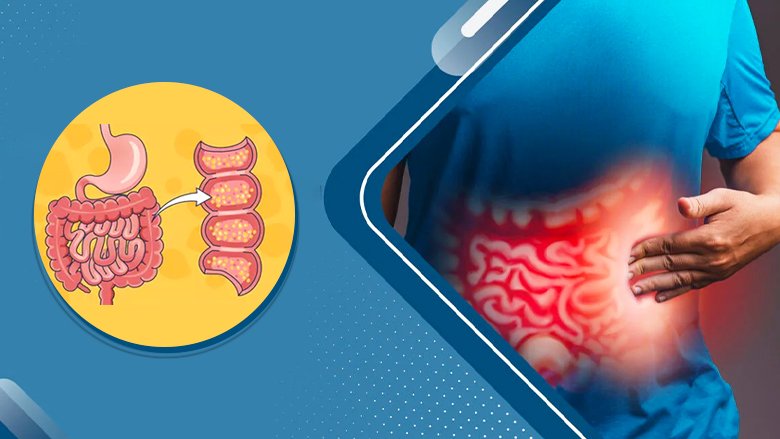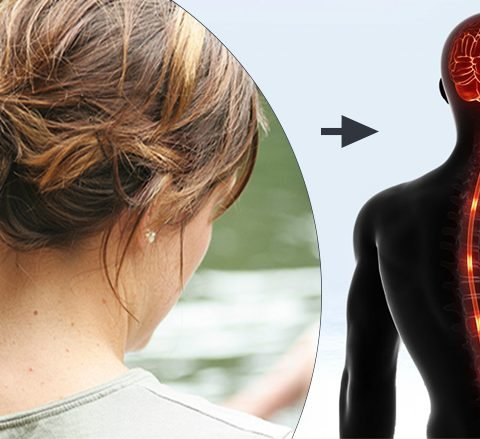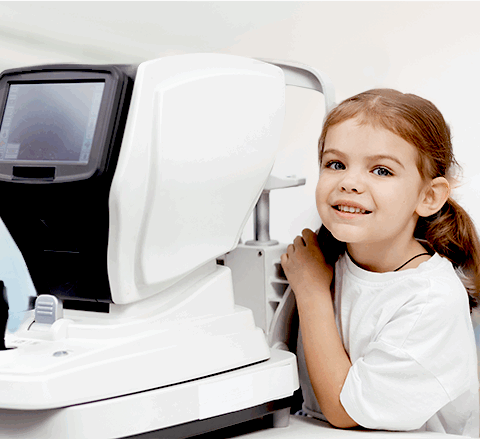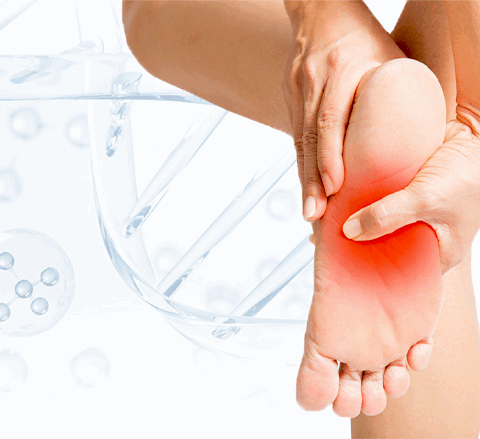📅 Published on: June 20, 2024 | 🔄 Updated on: December 22, 2025 | By: Stem Cell Care India

A gastrointestinal (GI) tract’s chronic inflammatory condition which is classified as an inflammatory bowel disease (IBD) is known as Crohn’s disease. Either it can be your mouth or anus, this disease can affect any part of the GI tract.. Crohn’s disease mostly affects the end of the small intestine which is ileum and also the beginning of the colon. What is the exact cause of this chronic disease is still unknown. But researchers say it can happen due to a combination of genetic, environmental factors, and immune system factors. People who have the family history of IBD may have higher chances of developing this disease.
Diet and smoking are the environmental factors that can target the GI tract because it triggered the abnormal immune response. The symptoms of Crohn’s disease can range from mild to severe and can be different among individuals. Diarrhea, Fever, Fatigue, Abdominal pain, Mouth sores, etc are the common symptoms of this chronic disease. Sometimes, Crohn’s disease can cause problems like the intestines becoming narrow (strictures), unusual connections forming between the intestine and other organs (fistulas), and pockets of infection (abscesses).
Patients who are suffering from chronic disease can take the best quality treatment as soon as possible. In rare cases, if you can’t find a way to treat this condition, then taking stem cell therapy can be a better option. At Stem Cell Care India, we provide top-notch treatment and care to treat the root cause of this medical condition. The aim of our treatment is to reduce the inflammation, control its symptoms, and help the patient to get better. This often involves using a mix of medications, such as drugs that reduce inflammation, medicines that weaken the immune system, and biologics that target specific parts of the inflammation process.
Crohn’s disease is a long-lasting condition that causes swelling in the digestive system. The symptoms can be different for each person and can be mild or very bad. Commonly, people with Crohn’s disease experience persistent diarrhea, which can sometimes be accompanied by bleeding. Abdominal pain is another frequent symptom, often described as cramping, and is usually located in the lower right quadrant of the abdomen. Fatigue is also common, as the body is constantly battling inflammation and malnutrition due to poor absorption of nutrients. Weight loss can happen because of a lack of appetite and the body’s difficulty in digesting and absorbing food. Also, some people may have a fever during flare-ups of the disease. Other symptoms can include mouth sores, less hunger, and signs of inflammation in other parts of the body like the eyes, skin, and joints.
Common Symptoms of Crohn’s Disease:
- Persistent Diarrhea: Frequent, watery bowel movements, sometimes with blood.
- Abdominal Pain: Cramping and discomfort, usually in the lower right abdomen.
- Fatigue: Constant tiredness and lack of energy due to inflammation and poor nutrient absorption.
- Weight Loss: Unintentional weight loss from reduced appetite and poor digestion.
- Fever: Elevated body temperature during disease flare-ups.
- Mouth Sores: Painful ulcers in the mouth.
- Reduced Appetite: Lack of desire to eat, leading to further weight loss.
- Joint Pain: Inflammation can cause pain and swelling in the joints.
- Skin Problems: Rashes, bumps, or sores can appear on the skin.
- Eye Inflammation: Pain, redness, and vision problems related to eye inflammation.
If patients will know about these symptoms in its early stage, then it would help them to easily manage Crohn’s disease. And improve their quality of life. Consult our doctors if you witness any of these symptoms we will provide you the best Crohn’s disease stem cell therapy after the diagnosis.
Crohn’s disease is a kind of inflammatory bowel disease (IBD) that makes parts of the digestive system swell and get irritated. The symptoms change depending on which part of the body is affected. They can include stomach pain, very bad diarrhea, feeling very tired, losing weight, and not getting enough nutrition. Crohn’s disease can hurt a lot and make you very weak. It can also cause serious problems that could be life-threatening. It is a long-lasting condition that goes through periods of getting worse and then getting better. We don’t know exactly what causes Crohn’s disease but it may happen when the body’s immune system reacts abnormally to bacteria in the intestines. Genetics and the environment may also play a role.
There are several types of Crohn’s disease, each named according to the specific location in the gastrointestinal tract where the disease occurs.
- Ileocolitis: This is the most common form of Crohn’s disease, affecting the end of the small intestine (the ileum) and the beginning of the colon. Symptoms often include diarrhea, cramping, and pain in the lower right part of the abdomen. Weight loss and anemia are also common in this type.
- Ileitis: Similar to ileocolitis, ileitis affects only the ileum. The symptoms are much the same, with abdominal pain and diarrhea being the most frequent. People with ileitis may also develop fistulas or inflammatory abscesses in the right lower quadrant of the abdomen.
- Gastroduodenal Crohn’s Disease: This type affects the stomach and the beginning of the small intestine (the duodenum). Symptoms include nausea, vomiting, loss of appetite, and weight loss. It can also cause upper abdominal pain and can lead to ulcers in the stomach or duodenum.
- Diffuse Jejunoileitis: This type causes patchy areas of inflammation in the jejunum, the upper half of the small intestine. Symptoms include abdominal pain, cramps after meals, diarrhea, and malnutrition due to poor nutrient absorption. It is a less common form of Crohn’s disease but can be particularly severe.
5. Crohn’s Colitis: This type affects only the colon. Its symptoms can include diarrhea, rectal bleeding, and skin lesions. People with Crohn’s colitis are at higher risk for colon cancer, and the condition can also lead to severe rectal disease and the formation of abscesses around the anus.
Crohn’s disease can affect any part of the digestive tract because it is an inflammatory bowel disease (IBD). Many people talk about several that may cause Crohn’s disease but there is no exact cause fully understood. But there are several factors that may contribute to its development and genetics is one of them. If someone’s family has a history of Crohn’s disease, then they have a higher chance of getting it too. Certain genes related to the immune system and inflammation seem to increase the risk.
In Crohn’s disease, the immune system attacks healthy bacteria, food, and cells in the digestive tract by mistake, which is really important.This causes long-lasting swelling and harm to the intestines. Things in the environment can cause disease in people who are likely to get it. Things like what you eat, smoking, getting sick, and feeling stressed can affect your immune system and the bacteria in your gut. This could make inflammation worse. Scientists think there could be a problem with the balance of gut bacteria in people who have Crohn’s disease. Usually, good bacteria keep our intestines healthy, but if there’s too much of the bad kind, it can cause inflammation.
Crohn’s disease is diagnosed through a combination of medical history, physical examination, and various tests:
- Medical History: Doctors gather information about symptoms such as abdominal pain, diarrhea, weight loss, and fatigue. They may ask about family history of inflammatory bowel diseases (IBD).
- Physical Examination: A thorough exam helps assess overall health and detect signs like tenderness or swelling in the abdomen, skin rashes, or mouth ulcers.
- Blood Tests: These check for signs of inflammation or anemia, which can indicate Crohn’s disease.
- Stool Tests: These help rule out other causes of gastrointestinal symptoms and can detect blood in the stool.
- Imaging Tests: Techniques like CT scans or MRI scans provide detailed images of the bowel, helping to identify inflammation, strictures, or abscesses.
- Endoscopy and Biopsy: A colonoscopy or sigmoidoscopy allows doctors to directly visualize the bowel and take tissue samples (biopsies) for examination under a microscope.
- Capsule Endoscopy: In some cases, a small camera capsule is swallowed to capture images of the small intestine.
- Balloon Enteroscopy: This specialized procedure can visualize and take samples from deeper parts of the small intestine.
- Diagnostic Criteria: These include specific guidelines and scoring systems to confirm the presence and severity of Crohn’s disease.
Early and accurate diagnosis is crucial for effective management and to prevent complications associated with Crohn’s disease.
Crohn’s disease is an inflammatory disease that can stay long and become worse if not treated right. Unfortunately this medical condition has not any cure but you can reduce its symptoms by choosing the right treatment option. Stem cell therapy for Crohn’s disease in India becoming the hope of the patients who are suffering from this chronic disease. Doctors at Stem Cell Care India harness the power of stem cells to differentiate them into different types of specialized cells. These cells are one of the best treatments and provide the positive outcomes to restore the damaged cells or tissue in the intestines which can cause Crohn’s disease.
If you are suffering from Crohn’s disease, then you will feel inflammation, pain, and other serious complications over the time. Stem cell treatment can treat these symptoms but this therapy may not work the same for everyone. Because this therapy is still under clinical trials and research. These stem cells can be taken from the patient’s bone marrow or fat tissue. This lowers the chance that the immune system will reject them. You don’t get any side effects and complications if you are taking this therapy because stem cells are used for the treatment derived from the patient’s own body. More studies are needed to see if it works well and is safe in the long run. Scientists are also studying different places to get stem cells from and improving how they use them in treatments.
The procedure for Crohn’s disease stem cell therapy in India will be done in 3 days. It will include several steps which are necessary for the treatment. Below we mentioned the steps from day 1 to day 3:
Day 1:
- Our staff pick you from the airport and drop you at the hospital.
- Doctor will ask you about your problem and listen to your concerns.
- Process of admission to the hospital.
- Some necessary clinical examinations and laboratory tests will be conducted.
- Provide you with supportive therapies.
Day 2:
- Stem cell therapy for Crohn’s disease will be started.
- Undergoes some other supportive therapies.
- Another session of physiotherapy.
Day 3:
- Last supportive therapy session for faster recovery.
- Doctors also give physiotherapy.
- Necessary documents for discharge.
- Take you back to the airport.
Necessary thing you should know
- Patients have to carry their identity proof such as Passport, Adhaar card, PAN card, Driving license because it can be used during the admission process.
- Patients should carry a hard copy of their past medical report.
Stem cells might be the best way to treat Crohn’s disease, a long-lasting inflammation of the digestive tract. This therapy uses stem cells to heal damaged tissues and control the immune system, providing a more complete way to manage the disease. Many medical centers use conventional treatment to treat Crohn’s disease which is also a good approach but it can surpass the symptoms and may take a long time to treat it.
Stem cells are typically obtained from the patient’s own bone marrow. These cells are collected with a special machine that takes them out of the bone marrow. Once separated, the stem cells are treated in a lab to multiply and get ready for treatment. They are then administered back into the patient through various methods:
- Intravenous administration: Stem cells are injected into a vein, allowing them to travel through the bloodstream to the affected areas of the intestine. This method is less invasive and can target multiple sites of inflammation.
- Intrathecal (lumbar puncture): Here, stem cells are injected into the spinal canal through a lumbar puncture. This approach aims to deliver cells directly to the cerebrospinal fluid, potentially affecting the immune response associated with Crohn’s disease.
- Intraarterial: Stem cells are introduced directly into an artery supplying blood to the affected intestine. This method provides a more localized delivery, targeting specific areas of inflammation with higher concentrations of therapeutic cells.
- Subcutaneous: Stem cells are injected just beneath the skin in this method. While not as direct as intravenous or intra arterial routes, subcutaneous administration allows for slower, controlled release of cells into the bloodstream, potentially reducing systemic inflammation.
- Intramuscular: Stem cells are injected into muscle tissue, where they can gradually release therapeutic factors. This method offers a simple and minimally invasive approach, although it may require multiple injections to achieve therapeutic effects.
Q1. What will happen if I have Crohn’s Disease?
Ans: If you have Crohn’s Disease, your digestive tract gets inflamed. Crohn’s disease can cause various problems such as stomach pain, diarrhea, weight loss, and tiredness. You might need medications, diet changes, or sometimes surgery to manage it. Regular check-ups with your doctor are important to keep it under control.
Q2. What type of foods can trigger Crohn’s disease?
Ans: The symptoms of Crohn’s disease can be managed if you avoid the food that triggers its symptoms. Below we listed some food you shouldn’t take during Crohn’s disease:
- Butter, mayonnaise, margarine, oils
- Carbonated beverages
- Coffee, tea, chocolate
- Corn
- Fatty foods
- Foods high in fiber
- Lentils, beans, legumes, cabbage, broccoli, onions
- Nuts and seeds (peanut butter, other nut butters
- Raw fruits
- Raw vegetables
- Red meat and pork
- Spicy foods
- Whole grains and bran
Avoiding alcohol like mixed drinks, beer, and wine can only cause higher risk of Crohn’s disease. A person who has lactose intolerance must avoid dairy products.
Q3. How to manage the symptoms of Crohn’s disease?
Ans: There is no permanent cure for Crohn’s disease now but you can reduce the symptoms of this medical condition by following a healthy diet, taking prescribed medicines, and avoiding stress. Regular exercise can help, too. Keep a food diary to track what foods trigger symptoms. Stay hydrated, avoid smoking, and get enough sleep. Consult with our doctor for personalized advice and treatment plans to keep symptoms under control.
Q4. What lack of nutrients can trigger Crohn’s disease?
Ans: Crohn’s disease isn’t directly caused by a lack of nutrients, but low levels of certain vitamins and minerals can worsen symptoms. Deficiencies in vitamin D, B12, iron, zinc, and folic acid can weaken the immune system and gut health, potentially triggering or aggravating Crohn’s disease. A balanced diet helps manage the condition.
Q5. Which part of the body is affected by Crohn’s disease?
Ans: Crohn’s disease mainly affects the digestive tract mostly the small intestine and colon. It causes inflammation that can lead to pain, diarrhea, weight loss, and other issues. The inflammation can occur anywhere from the mouth to the anus, but it is most common in the lower part of the small intestine and the beginning of the colon. You can reduce the symptoms of this medical condition with appropriate treatment and medicines. The most preferable treatment is stem cell therapy which shows remarkable results.
Stem cell therapy for Crohn’s disease not only reduces the symptoms but also reduces the symptoms from the roots and provides you with the quality of life. Crohn’s disease is one of the dangerous chronic diseases that makes your life harsher than ever. That’s why it is important to take the right therapy. This therapy will improve your health in various ways:
- It helps in reduction of inflammation in your gut to ease the pain and discomfort.
- Damaged tissues can be repaired through stem cell therapy for better digestion and fewer flare-ups.
- Many patients have longer times when their symptoms are less severe or go away.
- It can decrease the need for medication and reduce the side effects.
Stem cell therapy effectively manages the symptoms of Crohn’s disease than conventional treatment and provides the quality of life. People who are suffering from this medical condition, this therapy brings new hope for them.
One of the best therapies to treat Crohn’s disease is stem cell therapy. In this therapy, doctors use the power of stem cells to restore or replace the damaged tissues with new ones which helps the body to recover faster. Stem cells are the cells which have the regenerative potential and can differentiate into different specialized cell types. This therapy has shown promise in treating various conditions, including Crohn’s disease, which involves chronic inflammation of the digestive tract.
The primary goal is to reduce inflammation, repair damaged tissues, and restore normal function in affected areas. Stem cell therapy aims to improve the quality of life for patients by minimizing symptoms and promoting long-term remission. Here are the mechanism of Stem Cell Therapy in Treating Crohn’s Disease
- Cell Harvesting:
Stem cells are typically collected from the patient’s bone marrow, adipose tissue, or peripheral blood. These cells can also be obtained from allogeneic sources, such as donor tissue, to ensure an adequate supply.
- Cell Processing:
The harvested cells are processed in a laboratory to isolate and concentrate the stem cells. This involves purifying the cells and preparing them for transplantation.
- Anti-inflammatory Action:
Once administered, stem cells migrate to the sites of inflammation within the digestive tract. They release anti-inflammatory cytokines and growth factors that reduce inflammation and modulate the immune response.
- Tissue Repair and Regeneration:
Stem cells can differentiate into various cell types, including epithelial cells, which are crucial for repairing the intestinal lining. They promote the regeneration of damaged tissues, restoring the integrity and function of the digestive tract.
- Immunomodulation:
Stem cells help regulate the immune system, preventing it from attacking the digestive tract. This immunomodulatory effect contributes to reducing the chronic inflammation characteristic of Crohn’s disease.
- Long-term Benefits:
Stem cell therapy aims to achieve long-term remission by addressing the underlying causes of inflammation and tissue damage. Patients may experience reduced dependency on traditional medications and improved overall well-being.
People are finding a way which can help them to treat their Crohn’s disease without any side effects. In this case, stem cell therapy will be the best medical approach. You can get this therapy at Stem Cell Care India because we focus on providing high-quality stem cells to reduce the symptoms of the disease. We promise that every patient can get personalized care and expert advice. Our goal is set to help patients find relief and improve their quality of life. Our researchers and doctors use advanced technology and state-of-the-art techniques to treat this chronic disease. Our team will provide every type of support and ensure every patient can receive the highest standard of care. Trust us to be your partner in fighting Crohn’s disease. We work hard to bring hope and healing to those who need it.
Treating your Crohn’s disease can be expensive in different countries but at Stem Cell Care India you will receive this innovative medical approach with an affordable price range. Stem Cell Care India provides advanced treatments at much lower prices than western countries. Patients can save every penny if you take stem cell therapy from us. Now, you are thinking that the quality of treatment will also be low. We don’t compromise with the quality of the treatment because it can save many lives. Every individual who takes treatment from us is living their quality of life. Affordable stem cell therapy for Crohn’s disease in India makes Stem Cell Care India the preferable choice for many patients.
Patients experience several benefits and improvements after taking stem cell therapy for Crohn’s disease. Stem cell therapy is known for its potential and provides promising results which make it an innovative approach in regenerative medicine. Patients who are suffering from Crohn’s disease now experience reduction in inflammation, and fewer flare-ups. However, the success rate of this promising regenerative medicine can depend on several factors such as a patient’s health condition, types of stem cell they want, age of the patient, and many more. Our researchers are doing several clinical trials to make this treatment more effective.
Stem cell therapy is becoming the hope for the individual because it can treat various medical conditions including Crohn’s disease. Stem cell therapy aims to repair and regenerate damaged tissue and offer long-term relief and improving quality of life for patients unlike conventional treatments that focus on managing symptoms. At Stem Cell Care India, this therapy utilizes the patient’s own stem cells or donor cells to rebuild the affected intestinal tissue, which can reduce inflammation and enhance healing. Below we mentioned the advantages of stem cell therapy for Crohn’s Disease:
- Regenerative Potential: Stem cells have the ability to develop into various types of cells, aiding in tissue repair.
- Reduced Inflammation: By targeting the root cause of inflammation, stem cell therapy may alleviate symptoms more effectively.
- Minimally Invasive: Procedures are often minimally invasive to reduce the recovery times and risks associated with surgery.
- Customized Treatment: Innovative therapies based on individual patient needs and conditions enhance effectiveness.
- Potential for Long-term Relief: Unlike medications that require continuous management, stem cell therapy may provide longer-lasting benefits.
- Improved Quality of Life: By promoting healing and reducing symptoms patients may experience an improved overall quality of life.
If it is about quality, let’s start by saying that our aim is “to make quality stem cell treatments accessible to all the patients in need” and what use would all our efforts be if one of the most important elements of our aim is removed from the equation? Therefore we ask our patients to rest assured and we promise to maintain the best post possible quality control procedure for your utmost safety. Additionally, we also encourage all the curious or anxious patients to keep reading as we further state some of our quality control procedures in brief.
- Each new batch of the stem cell is foremost screened for any infections and passed further if it is deemed safe.
- Moving forward, stem cells will be tested for gram bacteria at various intervals to ensure that they are free of contamination.
- Gram Bacteria and Mycoplasma can also affect the media and instruments to be used for the treatments and therefore we send them for proper screening before making use of them.
- For further security against contamination, we check the stem cell’s final wash for any possible presence of the aerobic and anaerobic microorganisms.
- Every final batch of the stem cells is also screened for the endotoxin contents and is verified that their presence is only below the thresholds.
- Stem Cells could also mutate and become harmful during their processing therefore a study of karyotyping is performed on them to ensure their purity.
- Finally, if the stem cells are cleared in all the above-mentioned tests, they would be provided a “Certificate of Analysis” to relieve the patients of their worries.
Note: The procedures mentioned above are only related to safety tests of the stem cells, while our complete safety control profile also promotes various processing methods and restricts others for better and faster results. Our quality control methods also include the guidelines related to treatment safety by various international organizations for even increased patient security.
After taking stem cell therapy for Crohn’s disease, you will experience many changes in your body such as reduction in inflammation. Stem cell therapy is the well-known regenerative medicine that shows remarkable results in treating various medical conditions. Patients are enjoying their quality of life again. Crohn’s disease is an inflammatory condition which stays long. It is necessary to take the treatment during its initial stages to get the faster recovery. If the condition of a patient gets worse, then it will be difficult to treat it. However, team of researchers at Stem Cell Care India made this treatment more effective and successful by doing several clinical trials and research.
My name is Kiara Gonzalez. I was suffering from Crohn’s disease until I met with Stem Cell Care India. They changed my life by providing stem cell therapy. I was scared before the treatment but they encouraged and comforted me. Their doctors are very friendly by nature and discuss with me about my problem. The hospital is top-notch and equipped with several modern technologies. Hospital’s corridor is neat and clean. The therapy goes amazing and I experienced the outcomes in a few months. I am really grateful to their expertise and dedication to help patients like me. If you are considering stem cell therapy for Crohn’s disease, I highly recommend Stem Cell Care India for their excellent service and commitment to patient care.
— Kiara Gonzalez, Zihuatanejo, México.
Hello, I am Jenny Mathew and I was a patient of Crohn’s disease for about 1 year. It was hard to stay with this chronic disease because the pain was unbearable. I took various therapy to treat it but nothing could work. I lose my hope that I ever get treated. Then, I found Stem Cell Care India who provide top-notch stem cell therapy for various medical conditions including Crohn’s disease. Thank you Stem Cell Care India for treating my condition.
— Jenny Mathew, Manhattan, New York.
If you want to get better treatment for your Crohn’s disease, then you should go to India. There is a hospital named Stem Cell Care India and it was an amazing stem cell therapy centre. Hi my name is Ciandra Campbell and I was looking for a treatment which can treat my Crohn’s disease but I couldn’t find any. At the end I noticed a hospital which provides stem cell therapy for Crohn’s disease. I made an appointment with them and flew to India for my forward procedures. Doctors are excellent in their field and answer my every question. Hospital is clean and the staff was amazing. They provide me follow up care after the treatment to check if there are any side effects shown or not. I am feeling good now and credit goes to Stem Cell Care India.
— Ciandra Campbell, Scotland.
Stem Cell Care India provides me with the best quality stem cell transplantation to treat my Crohn’s disease. The therapy was all good and the staff members were very helpful. They use advanced techniques and modern technologies during the treatment. They also provide me the post treatment care to monitor the changes in my body. Now, I am healthy and living my quality of life. Thank you so much.
— Nitish Paul, Mumbai, India.
A quality certificate for stem cell therapy at Stem Cell Care India assures patients of high standards in treating Crohn’s Disease. It signifies that the treatment meets rigorous criteria for safety, effectiveness, and ethical practices. This certificate ensures that the stem cells used are of top quality and sourced responsibly. Patients can trust that the therapy follows strict guidelines and is administered by qualified medical professionals. It gives assurance that every step, from diagnosis to treatment, prioritizes patient well-being and adherence to medical standards. Ultimately, the certificate underscores a commitment to delivering trustworthy and reliable stem cell therapy for managing Crohn’s Disease.
Stem Cell Care India provides careful follow up if you are taking stem cell therapy for Crohn’s disease. After treatment, our main focus is to give ongoing monitoring to the patients to track how much the therapy progressed. Our doctors check that symptom like stomach pain, fatigue, inflammation, etc, are reduced or not. Follow up at our hospital involves various tests which make sure that the body of the patient is responding well and if there are any side effects shown, then it will catch. Regular check-ups are very important to see how well stem cell treatment works for treating Crohn’s Disease over a long time.
If you are taking stem cell therapy to treat Crohn’s disease, then it is important to understand that the outcomes of the treatment will be different for each patient. Stem cell treatment uses the regenerative potential of stem cells to alleviate the symptoms but it may not work for everyone. Treatment outcomes depend on various factors such as age of the patient, severity of the condition, and other factors. We promise you to provide top quality stem cell treatment but how it will work for you is dependent on your body and health conditions. It is really important to talk to healthcare experts to understand what you can realistically expect and the risks of the procedure. Making a good decision means thinking about the good things that might happen and the possible bad things. You can discuss your concerns with our medical experts if you have any.







